In search of a better life
In Pakistan, International Monetary Fund-led economic reforms have hit poor and working class hard
In its report published last month, the UN has reported a shocking truth: around 9,000 migrants died on migration routes in the year 2024. Asia experienced the highest number with 2,778 deaths, followed closely by Africa with 2,242, and Europe with 233. The journey across the Mediterranean Sea, a primary gateway to Europe, resulted in 2,452 deaths. Preliminary figures indicate at least 1,233 migrants died in the Americas. While most people were already aware of the danger-packed route of the Mediterranean Sea, the reality of the life-threatening journey hit the world when a boat carrying over 700 people capsized, resulting in the deaths of 400 people, including hundreds of Pakistanis. Just a few months before this tragedy, a Pakistani professional hockey player lost her life when the boat she was travelling in to reach Europe wrecked off the coast of Italy. What is even more distressing is the fact that this uncomfortable truth is only the tip of the iceberg. According to the UN, the near-9,000 figures could be understated since there is no official data on how many people use these migration routines to reach other countries and how many did not make it.
Migrants are often seen as a nuisance by countries where they plan to emigrate. While some nations try to be subtle when announcing their plans regarding the influx of migrants, the Trump Administration is notorious for denying migrants basic courtesy, focusing more on the illegal route taken by migrants than on the conditions that force people to flee their homelands. The situation is not any different in migrants’ home countries where policymakers hardly look into why people take drastic measures to leave their homes. Migrants from the South Asian and African regions make this dangerous decision to flee instability and economic inequality in their home countries. In Pakistan, the International Monetary Fund-led economic reforms have hit the poor and working class hard. From food and healthcare to education, every sector mostly follows a for-profit model, urging people to keep earning more. In a country where most skilled individuals earn a little over the minimum wage (Rs37,000), most people see their home country as a prison, where advocates of neo-liberal policies clip their wings. Besides this, political instability and the resurgence of terror activities in parts of the country create panic among people, who prefer moving out of the country to have a chance at a better life.
The government’s indifferent attitude towards a highly demotivated nation has had destructive effects on our economy. In a country where most entrepreneurs run their businesses like a private fiefdom, most people, both skilled and unskilled, see no future here. And when countries impose restrictions on migration, people’s desperation moves them to adopt alternative, high-risk routes. This problem can only be solved if the world comes together to act as a unit. Developed nations must invest in war-torn and economically weak countries to give them the support they need to grow. The 9,000 people who died last year have left nine thousand homes behind who may have been solely dependent on them. In a civilised world, no human should have to risk his/her life to feed his/her family or look after their basic needs. Only a migrant can tell the economic hardships that force them to set out on a perilous journey. And it is time they took centre stage to point out the areas the government needs to work on to make our country a safe space for its people.
-
 Horrifying Pictures Of The Kidnapper Of Savannah Guthrie's Mother Released
Horrifying Pictures Of The Kidnapper Of Savannah Guthrie's Mother Released -
 Andrew's Ex-girlfriend Launches Brazen Attack On Epstein Victims On Piers Morgan Show
Andrew's Ex-girlfriend Launches Brazen Attack On Epstein Victims On Piers Morgan Show -
 Andrew Mountbatten-Windsor 'on His Own' As Palace Gives Green Light To Law Enforcement
Andrew Mountbatten-Windsor 'on His Own' As Palace Gives Green Light To Law Enforcement -
 Kanye West's Tweet About Super Bowl Halftime Resurfaced After Bad Bunny's Show
Kanye West's Tweet About Super Bowl Halftime Resurfaced After Bad Bunny's Show -
 'FBI' Star Juliana Aidén Martinez Tease Her Return To 'Law And Order: SVU' After Quitting
'FBI' Star Juliana Aidén Martinez Tease Her Return To 'Law And Order: SVU' After Quitting -
 Cardi B's Emotional Words To Pal Amid Stefon Diggs Rumored Breakup Revealed
Cardi B's Emotional Words To Pal Amid Stefon Diggs Rumored Breakup Revealed -
 Princess Eugenie Breaks Cover Amid Explosive Family Scandal
Princess Eugenie Breaks Cover Amid Explosive Family Scandal -
 Will Kate And Anthony Have 'Bridgerton' Spin Off? Revealed
Will Kate And Anthony Have 'Bridgerton' Spin Off? Revealed -
 Schoolgirl Eaten Alive By Pigs After Brutal Assault By Farmworker
Schoolgirl Eaten Alive By Pigs After Brutal Assault By Farmworker -
 King Charles’ Statement About Epstein Carries A Secret Meaning: Here’s Why It Can Be An Invite To Police
King Charles’ Statement About Epstein Carries A Secret Meaning: Here’s Why It Can Be An Invite To Police -
 Demi Lovato Delivers Heartbreaking Message To Fans About Her Concerts
Demi Lovato Delivers Heartbreaking Message To Fans About Her Concerts -
 Sweden's Princess Sofia Explains Why She Was Named In Epstein Files
Sweden's Princess Sofia Explains Why She Was Named In Epstein Files -
 Activist Shocks Fellow Conservatives: 'Bad Bunny Is Winner'
Activist Shocks Fellow Conservatives: 'Bad Bunny Is Winner' -
 Noel Gallagher Challenges Critics Of Award Win To Face Him In Person
Noel Gallagher Challenges Critics Of Award Win To Face Him In Person -
 Minnesota Man Charged After $350m IRS Tax Scam Exposed
Minnesota Man Charged After $350m IRS Tax Scam Exposed -
 Meghan Markle 'terrified' Over Possible UK Return
Meghan Markle 'terrified' Over Possible UK Return




